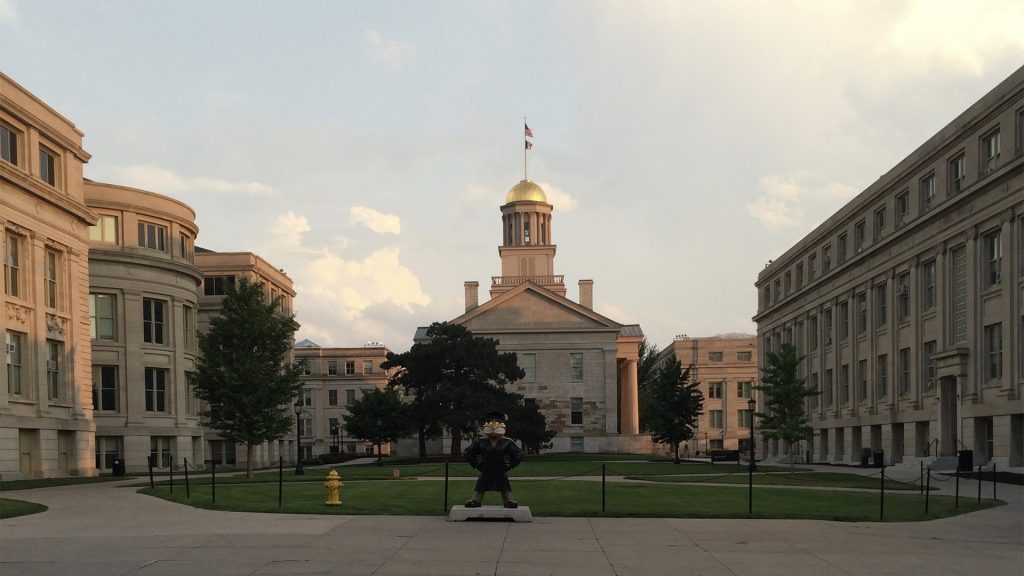Payne: Being first-generation brings uncertainty about heading home
As a first-generation student, I haven’t figured out how to share my college experiences with my family. Returning home means facing this new disconnect.
March 9, 2018
Much to my mother’s dismay, I’m not a huge fan of coming home for breaks.
It’s nothing personal. When I’m back in my hometown, I am welcomed by a family that is beyond thrilled to see the return of their college kid. I enjoy home-cooked meals and don’t have any siblings I’m forced to share food with. Best of all, I get to cuddle my cats again (usually against their will).
Since I moved to Iowa City in August 2016, there have been about 25 weeks of break time. I’ve spent maybe 12 of those weeks with my family and the other 13 here.
For a while, I thought the reluctance to leave Iowa City must be because I just love being a Hawkeye. But I recently realized the discomfort I feel before returning home for any extended period of time isn’t solely because I don’t want to give up my “Black and Gold.”
I’ve found I haven’t felt quite as connected to my family since coming to college. I’ve seemingly formed one identity for school and another to return home again, and it’s difficult to convey my experiences to people who haven’t gone through a similar journey themselves.
RELATED: UI helping first-generation students face higher education head-on
As a first-generation student, the University of Iowa remains nothing short of a dream — one that I worked hard my entire life to turn into a reality. I grew up with the understanding that if I wanted to pursue higher education, I had to figure out how to navigate this world on my own.
The uncertainty isn’t something I resent. I’m proud to be a first-generation student and embrace the expectations that come with that part of my identity; I know my success represents an upward path for my family, a bold step forward into previously uncharted territory.
Still, it’s not easy to reconcile my growth and change — my “college identity” that’s not quite familiar to my family — with the Marissa they’ve always known.
I’ve tried to keep the dialogue open with my parents to let them into this part of my life as much as possible. My dad doesn’t seem to understand enough about the university setting to be able to ask about it, but he appreciates the stories I tell. My mom is in the same boat, but she handles it by calling me rather frequently to try to keep up with the flow of my day-to-day life.
“Why are you so busy? What is it you’re doing that takes so much time?” she asked me one day, disappointed that, as usual, I only had time for a short phone call.
I settled on telling her that at any given moment, I’m attending classes, doing homework or studying, communicating with sources, working on articles, reading the news, somehow making time for sleep and food, and the list goes on … I couldn’t entirely explain how, but the tasks related to earning a degree, working at The Daily Iowan, and being a human all add up.
RELATED: Facing the troubles of higher education
This answer satisfied her a little. To me, it felt incomplete. What I didn’t share:
I rarely mention things that happen inside the classroom like I used to because my mom and dad can no longer keep up with what I’m learning. I feel guilty for being granted the privilege to earn a degree when only one of my parents even graduated from high school. I love journalism, but I often wish I wanted to pursue a career — as a doctor, a lawyer, an engineer — anything that would allow me to give back to my family more than I know I’ll be able to working as a reporter.
There’s not a day that goes by that I don’t wonder: Am I worth what my family and this university have invested in me? Is my future worth the burden?
I write about the university all the time, yet I can’t successfully convey the college experience to the people who raised me. Is there any set of words I could use to help bridge the gap? I don’t know, but I’m packing up, and I’m heading home for break.



